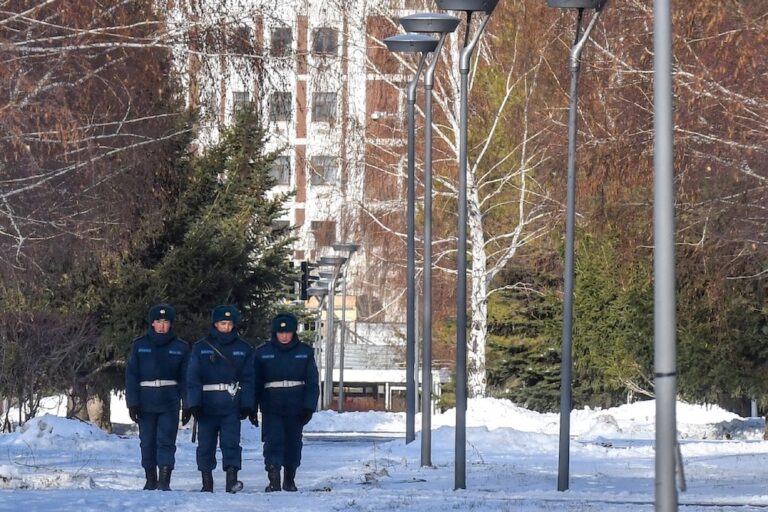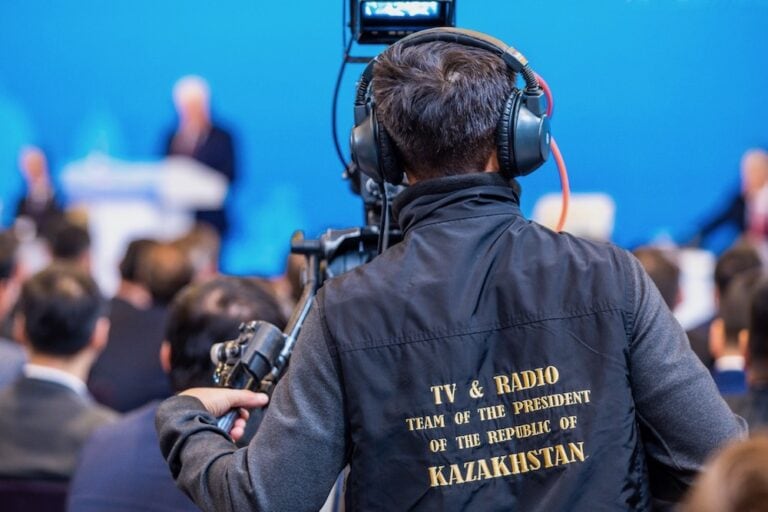The two main Kazakh opposition newspapers, Golos Respubliki and Vzglyad, have been forced to halt publication days after the prosecutor-general's office announced it had asked an Almaty court to ban a number of independent and opposition national news outlets.
UPDATE: Main opposition media silenced in space of a month (RSF, 28 December 2012)
(RSF/IFEX) – 4 December 2012 – Reporters Without Borders condemns the unprecedented pressure being put on the independent and opposition media in Kazakhstan. The two main opposition newspapers, Golos Respubliki and Vzglyad, were forced to halt publication a matter of days after the prosecutor-general’s office announced it had asked an Almaty court to ban a number of independent and opposition national news outlets, and before any ruling had been made on the substance of the case.
“The Kazakh justice authorities have acted in contempt of all laws in an unwarranted display of cynicism,” the press freedom organization said. “The closure of the newspapers prior to a court verdict amounts to a de facto conviction, yet they have not been given a chance to defend themselves.
“Such a move, the first time it has been done in Kazakhstan, stems from a distortion of the law that is all the more shocking since the laws themselves are tailor-made by Parliament. From the outset, the proceedings have been marked by so many irregularities and inconsistencies that the fairness of the decision is highly questionable.
“The immediate seizure of all reprints from the banned newspapers and raids on their premises rounded off an organized campaign to stifle critical voices in Kazakhstan.
“As the personality cult around President Nursultan Nazarbayev grows apace, we renew our appeal to the international community to make clear to the government in Astana that such abuses are unacceptable. The rapid turn of events in recent weeks is a demonstration, if one were needed, that urgent action is required. Civil society in Kazakhstan needs support more than ever.”
The prosecutor-general’s office announced on 21 November that it had asked an Almaty court to recognize the “extremist” nature of the two main opposition parties and the main independent and opposition media organizations in the country. On the same day, the court ordered the precautionary suspension of the newspaper Golos Respubliki. On 27 November, Vzglyad was told the same thing. The two newspapers were ordered to halt all printing and distribution. They announced they would turn themselves into online outlets, despite the fact that their websites and social network accounts were included in the prosecutor-general’s order.
On November 28, representatives of the department for executing court decisions carried out a violent raid on the premises of the two newspapers. The lawyer for Golos Respubliki, Sergei Utkin, reported that he was pushed violently by bailiffs who entered the editorial offices. According to the editor of Vzglyad, Igor Vinyavsky, who was jailed for nearly two months early this year, the bailiffs forced open the door and threatened staff, ordering them to hand over the latest edition of the newspaper.
The court officials also tried to seize a collection of stories with a print run of 99 copies, published under the title “Ne Vzglyad” (“This is not Vzglyad”). Under Kazakh law, a publication that prints fewer than 100 copies does not need to register with the authorities. However, most copies of Ne Vzglyad were seized by the police when they went on sale in the street.
Similarly, the 30 November edition of the opposition newspaper Azat, which reprinted some stories from Golos Respubliki, was withdrawn from sale.
The preliminary hearings, on 27 November for Golos Respubliki and 30 November for Vzglyad, were a public spectacle of a justice system that is prepared to resort to any irregularities to force through the bans on the two newspapers. The court did not acknowledge the fact that the trial was based on the conviction of a third person (Vladimir Kozlov, the leader of the Alga party), or the fact that the prosecution grouped eight titles together under the generic name Respublika, or the fact that a media organization is not a legal entity under Kazakh law.
A request by defence lawyers to subpoena the owners of the newspapers, not the titles themselves, was rejected. The Golos Respubliki trial is due to resume on 6 December and the Vzglyad case on 14 December.
The persecution of the independent media and the bias of the justice system are just a few signs of the ultra-authoritarian morass into which Kazakhstan is sinking. With great fanfare, the country celebrated a new festival on 1 December: First President’s Day. Nursultan Nazarbayev, a predator of freedom of information who has been in power since Kazakhstan’s independence in 1991, was hailed throughout the country with cries of “One country! One destiny! One leader!”


